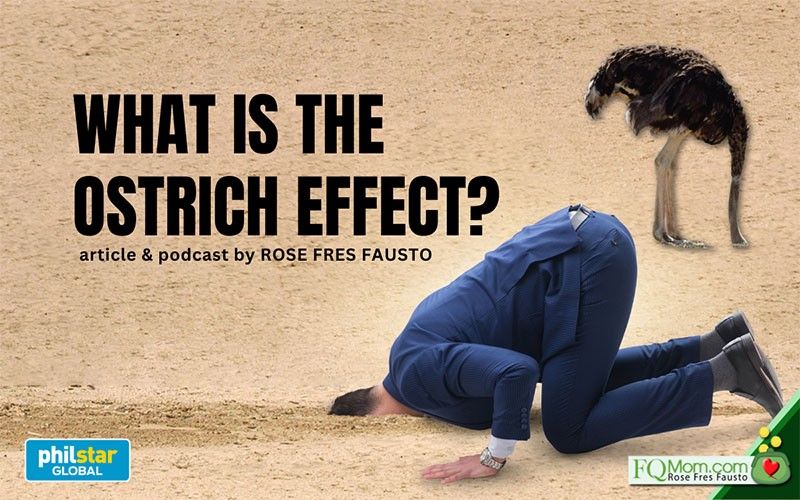What is the Ostrich Effect?


Years ago, I had this conversation with a friend of mine.
Friend: Kaya ako, ayoko ng nagpapa- check-up.
Me: Bakit?
Friend: E, baka malaman ko pa kung may sakit ako.”
This is an example of the Ostrich Effect, also known as Ostrich Problem. It is a cognitive bias where people tend to “bury their head in the sand” and avoid potentially negative but useful information to avoid psychological discomfort.

Before I proceed with the discussion of this cognitive bias, let me just correct this false legend. Ostriches are the largest living birds and despite their small heads, they have managed to survive as a species, which may already be a proof that they do not irrationally bury their heads in the sand to ignore danger or pretend it does not exist. On the contrary, they “bury their heads” to listen for sound waves to determine the direction of danger. Moreover, they also look like they bury their heads when they make nests for their eggs.
Okay, now that we’ve straightened that out, let us proceed to the topic for today.
Ostrich Effect/Problem was first coined in Behavioral Economics in a 2006 article by researchers Dan Galai and Orly Sade when they the used the term to describe people who avoid knowing the risk of some financial decisions or situations. (To read their paper, click "The Ostrich Effect" and the Relationship between the Liquidity and the Yields of Financial Assets)
Why do people like my friend avoid knowing the truth, no matter how useful it is? Any guess? Well, because they believe that ignorance is bliss!
After splurging on something, one may opt not to check his bank balance to avoid the discomfort of seeing it depleted. In handling regular expenses, one may opt not to list down each and every item to avoid seeing clearly that his income is way less than his regular expenses. In investing, one may opt not to check how it is doing when the market is going down.
Our human brain (our emotional Emong side) has the tendency to ignore negative information at times of risks or danger, hoping that everything will be ok. It tends to look for the information that will strengthen and confirm our original view. Add to that the “Pinoy Bahala na” attitude and we can end up missing on the opportunity to do something to improve our situation.
Come to think of it, no one is totally immune from the Ostrich Effect. Even I sometimes exhibit this when it comes to updating our Balance Sheet. It is just not fun to do this when the market is dull or crashing. But if the market is in a bull run, we all want to update and compute our paper income right away.
The flipside of Ostrich Effect
Inasmuch as it is bad for us to “bury our heads in the sand” to avoid seeing what’s happening to our portfolio, too much vigilance can also make us too agitated or over excited during market fluctuations. Remember our discussion on Myopic Loss Aversion? (Click link to read article.)

Because we feel the impact of a loss twice as much as we feel the impact of a gain, too frequent updates can also make us suffer from Money Myopia. We become too focused on short-term gains.
Balancing act
Both the Ostrich Effect and the Myopic Loss Aversion show our emotional Emong overpowering our Makatwirang Mak. Despite having two opposite actions (not looking at all versus too much looking), they both favor what is better for the feelings of the present self at the expense of our future self.
So, what do we do? As in anything in life, we are always better off striking that balance between two extremes. We cannot afford to bury our heads in the sand to ignore the potential bad news but we also cannot “kulit-check” our portfolio when it is becoming dangerous to our health.
Maybe we can go back to the ostrich and recall the real reason why they bury their heads in the sand. Ostriches have short peripheral vision and so they also rely on their hearing. Do you know that sound travels four times faster in solids such as ground than it does in gases such as air? Therefore, ostriches “bury their heads” to avoid danger, and this is not avoiding the information because they believe that ignorance is bliss. They avoid danger when they are able to hear the sound of it better in the ground, compared to when they stick out their heads up in the air.
Isn’t it amazing how similar it could be for us humans when it comes to our portfolio? It is when “bury our heads” and quiet ourselves that we can hear and really understand what’s happening. We can better recall what we are investing for. Is it for the long-term? What is the purpose of this investment? What sort of asset allocation is best for me at this stage in my life?
So, just like the ostrich, we should “bury our head” to protect ourselves from the outside noise that could lead us to impulsive actions. Let’s quiet down ourselves so we can figure things out and do what is best for us.
ANNOUNCEMENTS
1. Don’t “bury your head” and refuse to find out where you are in your FQ journey, take the FQ test now. Invite your loved ones too.

2. Give yourself and your loved ones the gift of High FQ with any or all of our FQ Books. Click here.




















